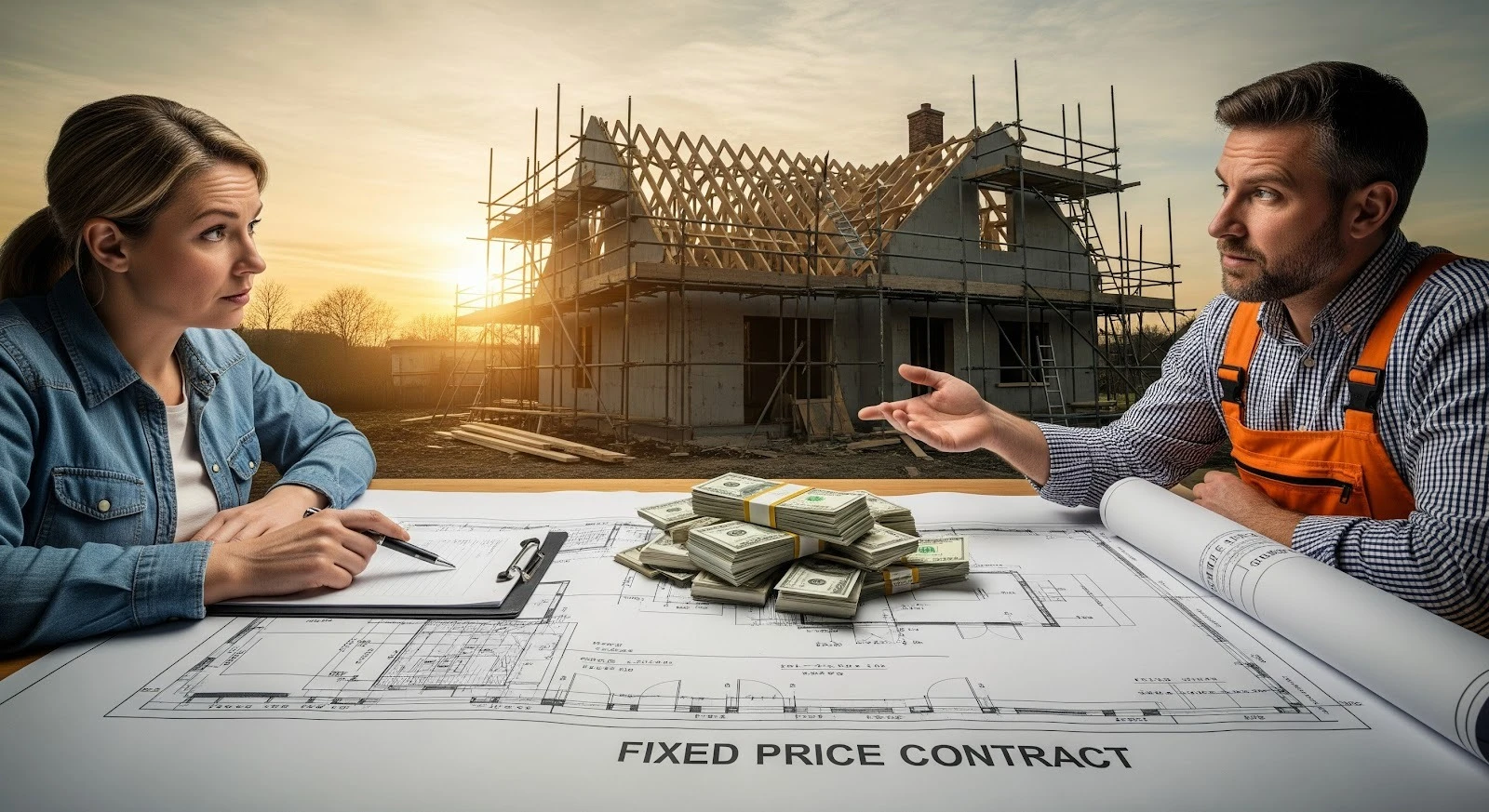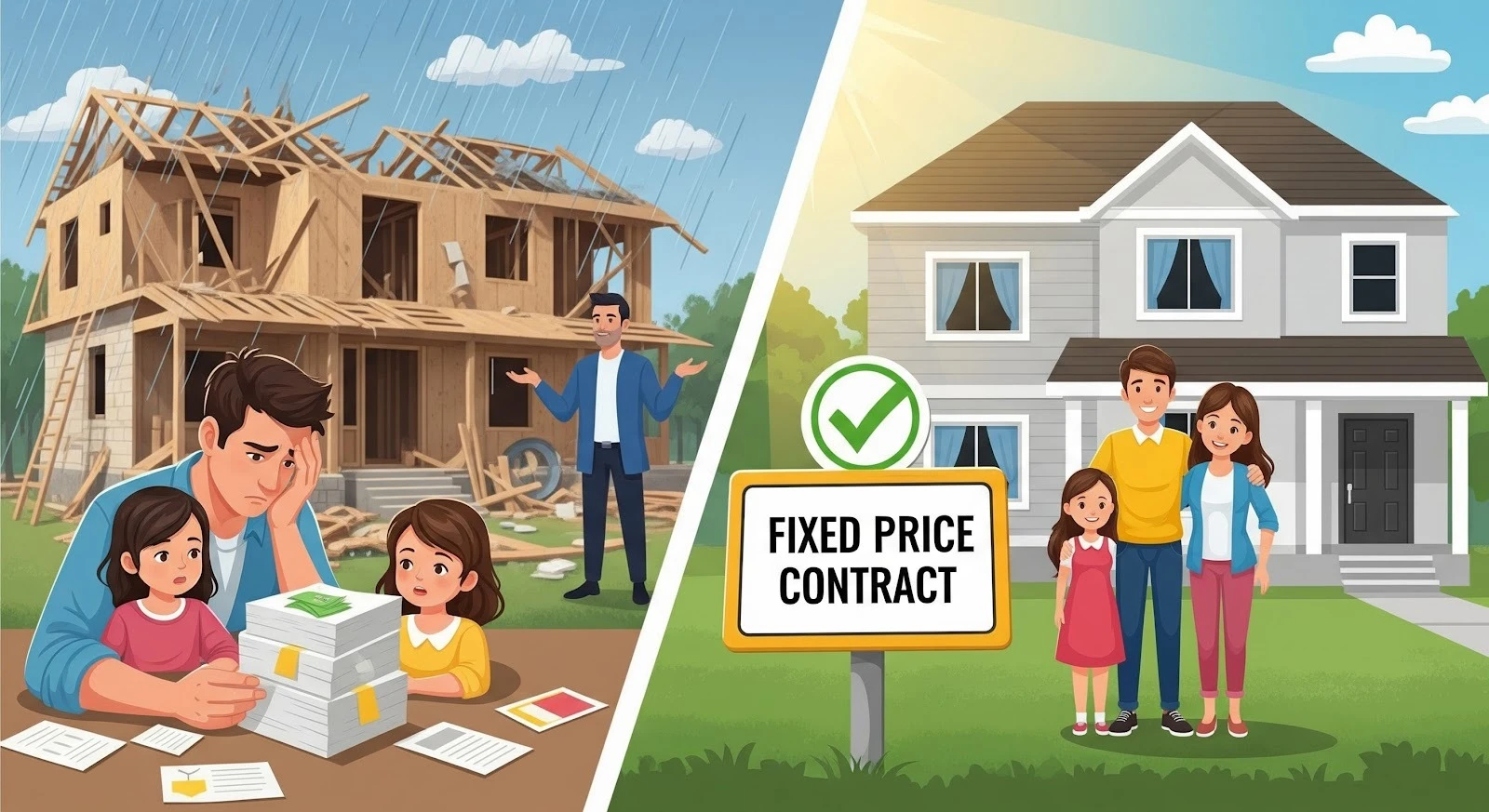Tips
Is a Fixed-Price Contract for Rebuilding a House Worth the Cost?

Home rebuilding can be a thrilling experience- particularly when you are considering building a bigger home, maybe because the one you have now is no longer suitable to your lifestyle or your old house is no longer relevant to your present state of life. You are clearing the property to design your dream layout, or just a few modifications are needed to modernise an older structure, one of the biggest questions which will come to your mind is how you will manage and control your budget. And that is where the concept of fixed-price contract is introduced. However, is it worth the price?
Now that we have unbundled the meaning of a fixed-price contract, discussed its advantages and disadvantages, and have given you a chance to make the right decision, is a fixed-price contract the right choice for your next rebuild project?
Further interpreting a Fixed-Price Contract.
A fixed-price contract is one where you and your builder agree on a price which gives an overall cost of the project at which the project is to be constructed. Cost plus deals are based on the fact that you pay as you go, with materials and labour costing you as you go up the value chain. In a fixed-price deal, however, you know exactly how much you will spend in advance. It may well sound like a dream come true, particularly when you heard tales of someone whose budget on renovation went haywire.
When it comes to the rebuilding of a house, the purpose of these contracts is to keep the home owners insulated against the cost blow out by reducing the number of unexpected costs. Any increase in the cost of the materials or unforeseen delays are absorbed by the builder and you are guaranteed to have a more certain financial position. There are however a few trade-offs with that security that can be learnt before putting your name on the dotted line.
The Positive: Certainty and Tranquility.
Certainty is the greatest advantage of a fixed price contract. You get to know what you are going to pay and thus you can budget on that. Such clarity proves priceless when you have to deal with a mortgage, temporary housing as your house is being put back up, or investment plans in the future. The assurance to know that the final figure will not balloon will allow you the liberty to concentrate on the fun bits like design, finishings and fittings that turn a house into a home.
Stress can also be minimized through this sense of control at what tends to be a complex logistically and emotionally demanding process. The builders providing such contracts usually have simplified systems with standard procedures and well trained project managers who are aware of how to keep things on schedule. Consequently, there is an improved flow of communication and less chances of being caught by a shock at the last minute.
The Possible Shortcomings: What You Are Paying.
Naturally, all the merits have a price. The price of your project at times inflates the premium that you pay to have certainty in costs in this case. A margin of safety is commonly added to fixed-price contracts by builders to allow them to deal with risks that might arise during the construction process, like changes in the price of materials, supply availability or ground conditions. This is so that you would actually pay more than you would have paid in a cost-plus set up where you would be charged only the real expenses.
The other question that comes up is whether you can change your mind on a project that is ongoing. The fixed-price contract is normally stiff in nature and any alterations will attract huge fines or administrative charges. Such inflexibility can be frustrating to you, especially when you are the type of person who just changes his plans when inspiration comes. Flexibility is an added expense and therefore it is important to complete all the details of the design at the beginning stage like flooring materials, light fixtures etc. and the design may not be subjected to any amendments later.
Comparison of Fixed and Variable Pricing in Real Life.
Imagine this: you are constructing a three bedroom family house back on the same block your house was on. Under a fixed-price contract you can pay a little more as an estimate to reflect the uncertainty of the market but you can sleep safe knowing that hiccups in the supply chain will not bust your budget.
However, when taking out a cost-plus contract, the quote might seem cheaper at the start of the process, however, any uncertainties that arise, including the discovery of asbestos during demolition or additional excavation might result in the price soaring high. The decision will be based on how risky you are willing to be and how sure you are that your decisions will remain simple during the construction.
Simply stated, fixed price contracts purchase serenity at a high price. Depending on your priorities, such a premium is justified or not. When you need some sense of security and do not want to have any financial surprises, it is often worth it. A variable arrangement can be more attractive to you, in case you would like to be more flexible and feel at ease moving around the cost changes.
Knock Down Rebuild Packages and the reason as to why they usually contain fixed pricing
A large number of Australian builders provide streamlined knock down rebuild packages and often provide fixed-price contracts. These packages would take demolition, design and construction into a single and unified process, which is good news to the home owners who desire convenience. The builder takes care of all the phases, making sure that it complies with the regulations of the council, arranging the site preparation, and the approvals.
These packages are better off having fixed pricing which will provide the families with peace of mind when they are buying what will be essentially a turnkey solution. You decide on a tried and tested layout, make customized choices and continue with the knowledge of the cost involved. Although not the most fitting option in terms of being able to design a pathway in the manner a homeowner desires, it is well fitted to those who want a smooth and effective road to a brand-new house without any unknown expenses.
The Investment Perspective: Long-Term Managing Value.

Investment wise, a fixed-price rebuild may also enable your positioning to be stronger. Clear cost control assists you to estimate the possible returns in a more precise way. You are able to plan how to use the equity in future, easily manage the cashflow as well as how to align your property objectives with the overall financial plans like building wealth through property.
Even though you have plans to stay in the house or rent or sell it later, the right budget managed will save your profitability because of excessive expenditures. Predictability of upfront pricing is easier to predict the outcomes, especially the option is helpful to investors who have to deal with numerous properties or the home renovators that enter the market with limited capital reserves.
Summary: a tradeoff of Security and Flexibility.
Whether to commit a fixed-price contract or not is a matter that is really dependent on your personality and financial aspirations. When you are concerned with stability, predictability, and peace of mind more than with creative flexibility, then the higher initial quote tends to be well justified. But in case you are a person who likes to take everything to detail and does not mind taking care of price changes, a variable contract can make a great value.
It should be an exciting process, not just a stressful one, of restoring your home eventually. Knowing what you have to choose is power that equips you with making decisions that are informed and cost-efficient, certain, and creative. To a lot of homeowners, particularly those who have adopted modern packages of knock down rebuilds, fixed price contracts provide them with a solid ground of making their dream homes come true.




